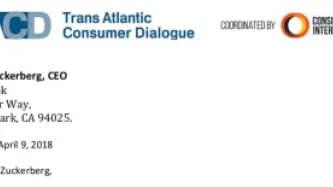Advanced Search
Content Type: Examples
In 2017, Facebook introduced two mechanisms intended to give users greater transparency about its data practices: the "why am I seeing this?" button users can click to get an explanation of why they're being shown a particular ad, and an Ad Preferences page that shows users a list of attributes the system has inferred about them. To examine the level of transparency provided by the respective ad explanations and data explanations these two mechanisms provide, a group of researchers conducted a…
Content Type: Examples
As of early 2018, Facebook's friends recommendations (People You May Know) are based on the address books users give them. However, Facebook has been filing patent applications for a new generation of technologies for collecting more information about its users and matching them more accurately. One, filed in 2014, describes technology to discern whether two people might know each other from smartphone data including location, accelerometer, and gyroscope readings, which show how often two…
Content Type: Examples
Research from ProPublica in December 2017 found that dozens of companies, including Verizon, Amazon, and Target are using Facebook to target job ads to exclude older workers. Excluding older workers is illegal under US law, but Facebook's system allows advertisers to specify precisely who should see their ads. Verizon, for example, specified that its effort to recruit applicants for a unit focused on financial planning and analysis would run on the Facebook feeds of users 25 to 36 years…
Content Type: Examples
Facebook and Twitter have advised Damian Collins, the chair of the UK Parliament's digital, culture, media, and sport committee, that the companies will hand over some information relating to the rearch of Russia-backed posts during the EU referendum. Facebook has already given the US Senate similar information about Russia-backed posts during the 2016 presidential election; this information showed that campaign ads and fake news generated by the Internet Research Agency troll factory in St…
Content Type: Examples
Among the friends Facebook recommended to Kashmir Hill as people she might know was Rebecca Porter, to the best of her knowledge a total stranger. Because Hill was studying how the "black box" of Facebook recommendations worked, she contacted Porter to ask what the connection might be. To her surprise, Porter turned out to be her great aunt by marriage, unknown to her because her biological grandfather had abandoned her father, who was adopted and never learned his biological history until…
Content Type: Examples
A mistake in Facebook's machine translation service led to the arrest and questioning of a Palestinian man by Israeli police. The man, a construction worker on the West Bank, posted a picture of himself leaning against a bulldozer like those that have been used in hit-and-run terrorist attacks, with a caption that correctly translates to "good morning". Facebook's AI translated it into "hurt them" in English or "attack them" in Hebrew. Based on that, police officers arrested him later that day…
Content Type: Examples
In 2015, Facebook's AI lab announced that its researchers had devised an experimental algorithm that could recognise people in photographs even when their faces are hidden or turned away. The researchers trained a sophisticated neural network on a dataset of 40,000 photographs taken from Flickr, some full-face and others facing away and were able to reach 83% accuracy. The company hopes an algorithm like this one could help apps like Facebook's then-new Moments sort photos into groups. …
Content Type: Examples
In 2016, Facebook gave conflicting accounts of whether the service uses location data in order to recommend prospective Friends in its "People You May Know" feature. When the company first admitted - for publication - that location data was indeed one of the signals it used, many users felt this explained some of the PYMK recommendations they were seeing and experts pointed out the similarity to the NSA's techniques as were exposed in 2013 by the Snowden revelations. A few days later,…
Content Type: Examples
In 2015, The Intercept obtained documents showing that the Mall of America in Bloomington, Minnesota used a fake Facebook account to friend and monitor local Black Lives Matter activists, and collect their personal information and photographs without their knowledge. The account was discovered in a cache of files the Mall of America provided to Bloomington officials after a large BLM protest against police brutality that was held at the mall. After the protest, the city charged 11 protesters…
Content Type: News & Analysis
Today, the Transatlantic Consumer Dialogue (TACD) sent a letter to the CEO of Facebook, Mark Zuckerberg, urging Facebook to adopt the General Data Protection Regulation (GDPR) as a baseline standard, not just for EU consumers as it is required, but for all Facebook services.
The letter comes ahead of Facebook Chief Executive Officer, Mark Zuckerberg’s, appearance before congressional committee over Cambridge Analytica’s misuse of customer data to interfere in the U.S. presidential election.…
Content Type: Examples
Facebook has come under fire after leaked documents revealed the social media site has been targeting potentially vulnerable children.
The allegations suggest the company is gathering information on young people who “need a confidence boost” to facilitate predatory advertising practices.
Confidential documents obtained by The Australian reportedly show how Facebook can exploit the moods and insecurities of teenagers using the platform for the benefit of advertisers.…
Content Type: Press release
Key points
Privacy International has obtained previously unseen government documents that reveal British spy agency GCHQ collects social media information on potentially millions of people.
GCHQ collected and accesses this information by gaining access to private companies’ databases.
Letters obtained by Privacy International reveal that the body tasked with overseeing intelligence agencies’ activities (the Investigatory Powers Commissioner) was kept in the dark as UK intelligence…
Content Type: News & Analysis
An investigation released by Privacy International this week reveals the Facebook shut-down Thailand experienced in May 2014, at the height of the military coup, may have had more to do with attempting to surveil online communications, rather than censoring Facebook users. This revelation indicates there could be more to other previous internet shutdowns that have happened during times of political unrest.
In May 2014, following months of protest, the Thai military overthrew the…
Content Type: Press release
Transparency reports have traditionally played a critical role in informing the public on the lawful access requests made by governments to companies like Facebook. These reports have provided a useful accountability mechanism for users to know what governments are asking for and how often. Transparency reports also inform users as to what intermediaries are doing to protect their privacy when it comes to sharing data with governments. Given Facebook's ever-growing presence in the lives of…
Content Type: News & Analysis
Facebook's new "Download your Information" feature reveals a radically different interpretation of transparency to one that the rest of us in Europe might hold. The feature may be a promising start, but the company still clearly has difficulty understanding the requirements of European Data Protection law. The feature provides only a fraction of the personal information held by Facebook and is thus still in violation of law.
The company may escape a prosecution under the UK Trades Description…
Content Type: News & Analysis
On the 2nd of August 2011 the Hamburg Commissioner for Data Protection and Freedom of Information has called on Facebook to delete the feature on the social networking site that automatically recognizes facial features and "tags" users when others upload photos of them. According to the local German data protection authority the feature is a violation of local and European data protection laws, and Facebook should adapt the feature to European data protection law or suspend the use of the…













